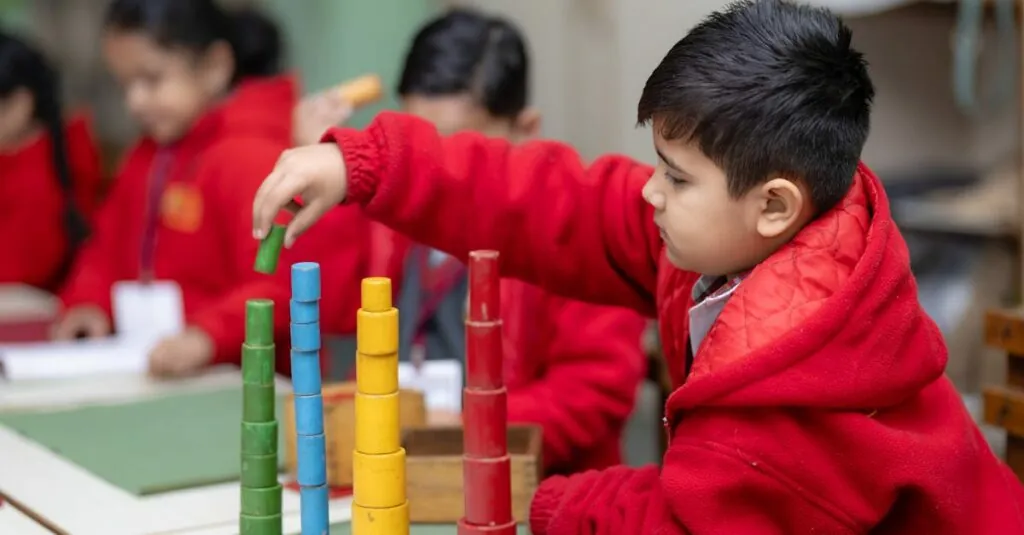Table of Contents
ToggleUnderstanding child development is like piecing together a puzzle where each piece plays a crucial role in the big picture. The five domains of child development—cognitive, physical, social-emotional, language, and adaptive—are the building blocks that shape a child’s growth. Think of them as the Avengers of development, each with unique powers that contribute to a well-rounded superhero in the making.
Overview of the 5 Domains of Child Development
Understanding the five domains of child development provides insight into how children grow and thrive. Each domain interacts to shape overall development, influencing a child’s future.
Cognitive development involves mental processes, including thinking, learning, and problem-solving. This area affects how children understand the world around them through curiosity and exploration.
Physical development encompasses growth and motor skills. Children gain strength and coordination over time, moving from crawling to running, which enhances their ability to engage in various activities.
Social-emotional development focuses on a child’s ability to interact with others and understand feelings. Building relationships, managing emotions, and developing empathy are essential skills acquired during early years.
Language development allows children to communicate effectively. This domain includes vocabulary acquisition and the ability to express thoughts and feelings verbally, laying the groundwork for future literacy skills.
Adaptive development refers to practical skills children learn to function in daily life. These skills range from self-care tasks like dressing and eating to managing routines, which build independence and confidence.
Each domain contributes uniquely, emphasizing the importance of holistic approaches in nurturing child development. Understanding these areas enables caregivers, educators, and parents to support growth effectively.
Physical Development
Physical development reflects a child’s growth in size, strength, and coordination. This domain significantly impacts overall health and facilitates active engagement in daily activities.
Gross Motor Skills
Gross motor skills involve movements that engage large muscle groups. Children develop abilities like walking, running, jumping, and climbing. Progress typically occurs in stages, starting from rolling over and crawling to mastering running and playing sports. These skills enhance balance, coordination, and endurance. Engaging in outdoor play fosters these skills, providing opportunities for running and climbing. Importance lies in early participation; the earlier children practice these movements, the more proficient they become.
Fine Motor Skills
Fine motor skills focus on smaller muscle groups, particularly those in the hands and fingers. Activities such as grasping objects, writing, and buttoning clothes illustrate these skills. Development advances from simple tasks like grasping a toy to more intricate actions like drawing and using scissors. Encouraging activities like puzzles and building blocks enhances dexterity and hand-eye coordination. Prioritizing these skills lays a foundation for later academic tasks, making them crucial for school readiness and independence.
Cognitive Development
Cognitive development encompasses mental processes critical for understanding the world. Learning, thinking, and problem-solving are essential in shaping a child’s interactions with their environment.
Language Skills
Language skills emerge as children enhance their ability to communicate. Vocabulary acquisition plays a significant role, with children learning words through interaction and exposure to language-rich environments. Expressing thoughts and feelings contributes to effective communication. Engaging in conversations, reading books, and playing language-based games strengthens these skills. Children also begin to understand the structure of language, which supports future literacy. Listening skills further develop as children interact with peers and caregivers, creating a foundation for collaboration and social bonding.
Problem-Solving Abilities
Problem-solving abilities develop through exploration and experience. Children learn to identify challenges and think critically to find solutions. Engaging with puzzles, games, and hands-on activities fosters this skill set. This encourages them to experiment with various approaches to reach a solution, thereby enhancing their cognitive flexibility. Observing adults tackle challenges helps them learn effective strategies. Advances in problem-solving abilities also lead to greater independence, allowing children to navigate everyday situations with confidence. Thus, nurturing these skills is vital for holistic cognitive development.
Social and Emotional Development
Social and emotional development plays a critical role in a child’s ability to connect with others and navigate their feelings. This domain fosters the skills necessary for building relationships and understanding emotions.
Interpersonal Skills
Interpersonal skills evolve as children engage with peers and adults. Sharing toys or taking turns during play helps them learn cooperation. These interactions build friendships, allowing children to communicate effectively. Observing others and imitating social behavior also supports skill development. Group activities like team sports or collaborative projects encourage teamwork, helping children understand group dynamics and social norms.
Emotional Regulation
Emotional regulation refers to a child’s ability to manage feelings. Recognizing emotions such as happiness, sadness, or frustration is crucial. As children practice expressing emotions appropriately, they become more resilient. Simple strategies like deep breathing or counting to ten can aid in calming down during stressful situations. Providing guidance helps children learn to navigate conflicts effectively, which contributes to their overall emotional well-being. Environments that support emotional growth enable children to thrive, reinforcing their confidence and nurturing positive relationships.
Moral Development
Moral development plays a crucial role in shaping a child’s ethical framework and interpersonal relationships. Through this process, children learn to navigate complexities of right and wrong.
Understanding Right and Wrong
Understanding right and wrong begins early in childhood. Children often grasp basic concepts of fairness, sharing, and respect through interactions with caregivers and peers. Situational examples, such as observing consequences for actions, help them internalize moral standards. Engaging in discussions about feelings and scenarios fosters critical thinking about decisions. By participating in role-playing and storytelling, children explore moral dilemmas, allowing them to better formulate their values. Parents and educators greatly influence their moral compass through modeling behaviors aligned with ethical principles.
Empathy and Compassion
Empathy and compassion develop as children connect with others’ feelings. Observations of family dynamics and friendships significantly impact this growth. Demonstrating empathetic responses encourages children to consider others’ perspectives and emotions. Activities, like volunteering or helping a peer, reinforce the importance of compassion in social interactions. Encouraging conversations about experiences and emotions nurtures their ability to empathize deeply. Additionally, literature and stories that showcase diverse human experiences offer valuable lessons about kindness and understanding. Through consistent practice, children cultivate a compassionate mindset crucial for healthy relationships.
Conclusion
Understanding the five domains of child development is crucial for fostering a child’s growth into a well-rounded individual. Each domain—cognitive, physical, social-emotional, language, and adaptive—interacts to shape a child’s abilities and experiences. By recognizing the significance of these areas, caregivers and educators can create supportive environments that promote holistic development.
Incorporating activities that engage all five domains not only nurtures essential skills but also prepares children for future challenges. As children learn to navigate their world, the interplay of these domains lays the groundwork for lifelong learning and meaningful relationships. Prioritizing this comprehensive approach ensures children thrive emotionally, socially, and intellectually.







